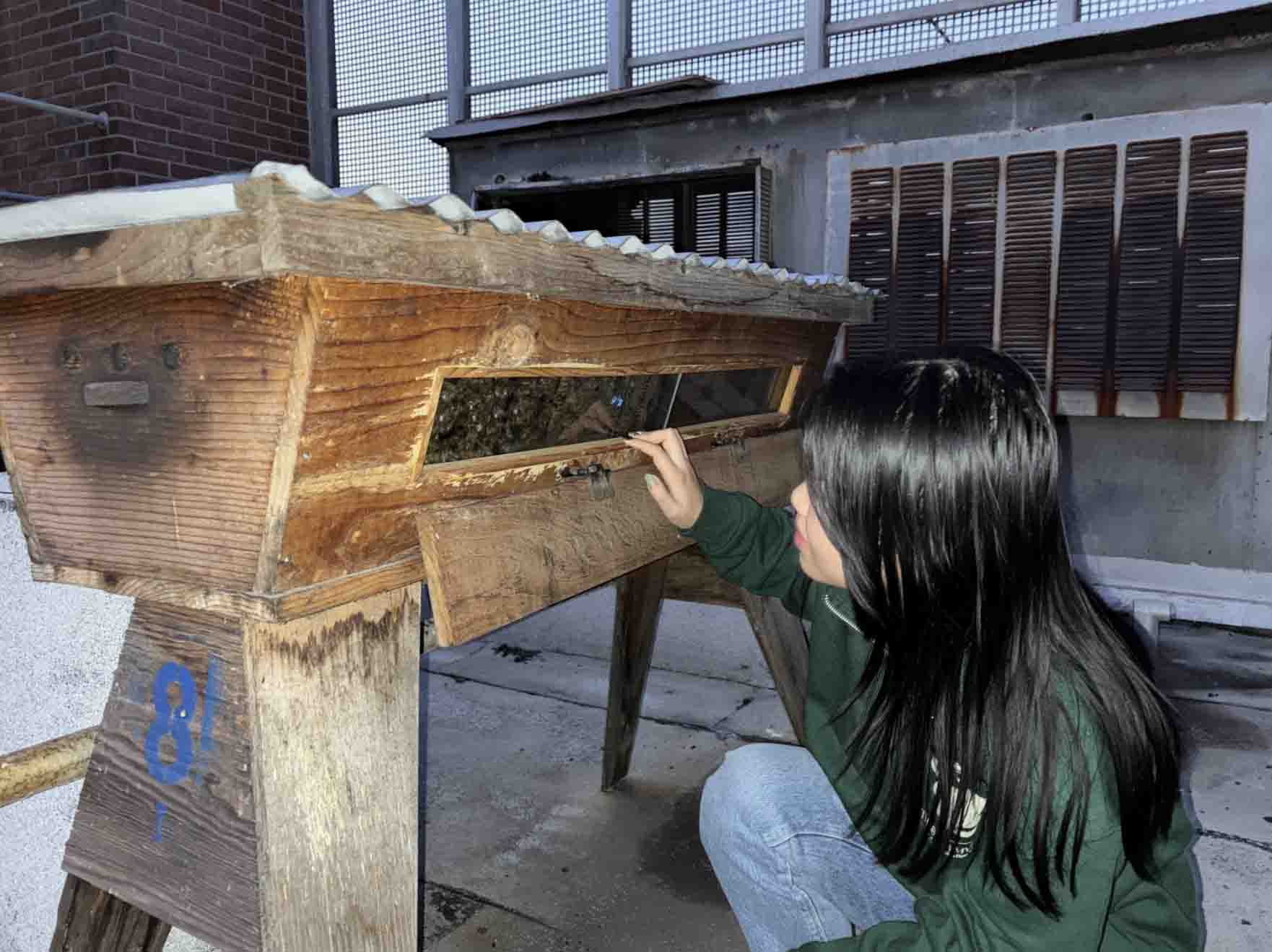Bruin Beekeepers at UCLA preserve on-campus hives, share honey with community
The Bruin Beekeepers club maintains the school’s apiary on the roof of the Life Sciences Building. The collected honey will be delivered to the Community Programs Office food closet. (Courtesy of Zoya Alam)
By Zoya Alam
Feb. 12, 2025 12:39 a.m.
Locked behind a keypad door on the roof of the Life Sciences Building is UCLA’s apiary – a collection of beehives carefully maintained by the Bruin Beekeepers club.
The club was founded with hopes of increasing beekeeping education, conducting native bee research and maintaining a honey bee apiary on campus, said Kelly Luong, a fourth-year biology student and president of the Bruin Beekeepers. Members of the club spent Jan. 29 labeling honey jars with the Bruin Beekeepers logo and prepping the jars for donation.
This was the club’s first honey harvest, Luong said, adding that most of the honey students labeled came from the hives in UCLA’s apiary or from a UCLA-associated ranch in Santa Paula.
The gold-colored honey – bottled in two-ounce jars – was harvested last June, Luong said. It took around a year for this honey to be ready for harvesting, she added.
The bees’ honey frames are usually removed before winter, Luong said. Then, the layers of the frame are run through a centrifuge, where honey flows down due to its weight and is then filtered and bottled, she added.
The collected honey will be delivered to the Community Programs Office food closet, the school’s anonymous food pantry, which provides students with food items and other basic necessities, Luong said.
“It was always our intention to just give it back to the students,” Luong said.

Although the honey is not currently for sale, Luong said UCLA Dining has shown interest in purchasing honey from the Bruin Beekeepers. She added that the club is planning to collaborate with the Westwood Food Cooperative this quarter.
“They take leftover produce from farmers markets, and we’re hopefully planning on doing a community dinner with them themed around honey,” Luong said.
In addition to maintaining bee hives and tracking the native bee population around UCLA, the Bruin Beekeepers also visit local schools – such as the UCLA Lab School – to host workshops about bees and their habitats, Luong said.
Luong added that club members work with UC Davis and the California Master Beekeeper Program to become certified beekeepers – which gives them the knowledge they need to maintain beehives and be able to conduct inspections on other beehives.
Mason Possinger, a fourth-year materials engineering student, said he has been in the club since his freshman year, adding that he completed his bee apprenticeship and is a certified beekeeper.
Possinger added that bees are important not only for the benefits of the honey but also for the environment.
“A lot of bees, bee as a general concept, they have really important roles as pollinators in their local environments,” Possinger said.
Before the rooftop was an apiary, it had been initially used as an aviary – an enclosure for birds, Luong said. The founders of the club worked to convert the space to be a home for bees, she said.
One thing Possinger said he looks out for as a bee inspector are varroa mites, a type of parasite that poses a threat to bees in urban areas such as Westwood.
“There’s pretty good weather for the bees, so the bees can be pretty active a lot of the time,” Possinger said. “The one thing that we have to look out for is the varroa mites. … They basically latch on to the larva inside the frames in the hive and feed on the larva.”
Among the club members labeling honey jars was Mario Sanchez, a first-year political science student. Sanchez said he joined the club to be a part of a community that loved bees as much as he does.
Parker Horne, a first-year psychobiology student, said this labeling event was the first time she attended a club meeting. She said she maintains her own bee farm in Texas and said this club helped her feel at home at UCLA.
“It’s a really wonderful club,” Horne said. “The people who run it are all very kind, and it’s very welcoming. No matter if you’re a veteran beekeeper or you’re just starting, I would recommend it to anyone.”
